Ngardarb Francine Riches, Bardi elder and great gospel servant, dies at 59
Ngardarb closed almost every gap that matters.
Readers, please note: This story contains images and references to a deceased person.
The sea itself seems to vanish. Looking west from the shores of Bardi country, there was only sand now. Two-and-a-half hours north of Broome, the tide is titanically powerful. When the sun and moon join forces, the sea makes a vertical drop of up to 12 metres, sending the Indian Ocean back to India. And like Moses and Miriam, what once may have drowned you is now safe to walk, ready for a great journey.
I was hit with that emptiness here in Canberra as a text arrived from Pastor Tony Riches of the Aboriginal Evangelical Fellowship based in Perth. His wife of 40 years, the mother of his four magnificent sons, the great Bardi elder and gospel servant, had been called home by the Lord.
Aunty Francine Riches, known to her family by her traditional name, Ngardarb, died early in the morning of 13 February 2024. She was 59.
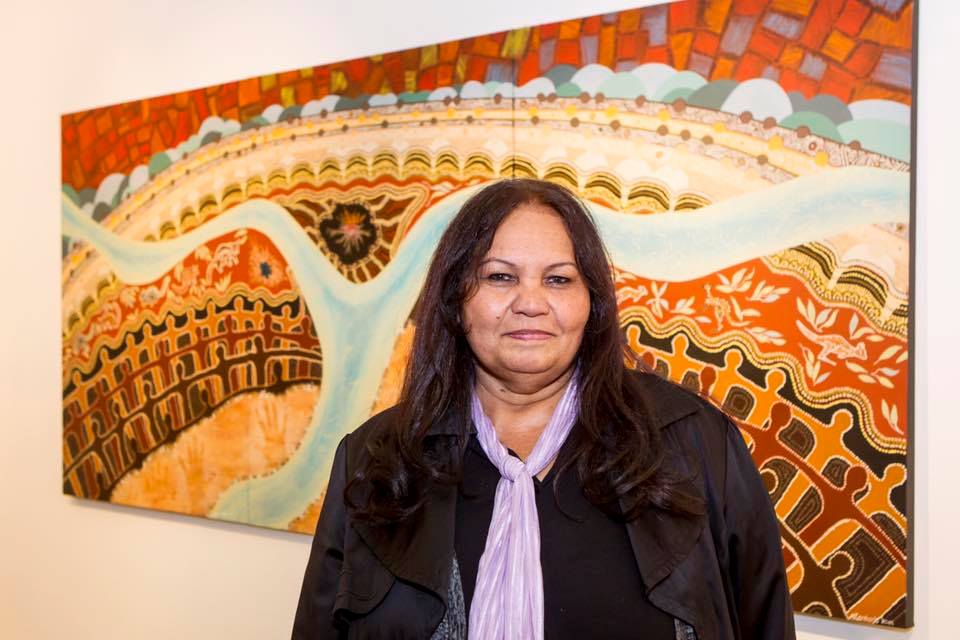
Ngardarb in front of her artwork, 2017
A few hours after she took her last breath at Murdoch Hospice, the Indigenous policy experts were releasing the Closing the Gap report in federal parliament. That timing makes sense because Ngardarb closed almost every gap that matters.
On healthy children, Ngardarb closed the gap. And smartly, too. Statisticians tell us the mortality rate for Indigenous families is twice that of others. Still, her four sons, who grew up in their mother’s country, are all impressive, athletic men with growing families. Billy, Luke, Daniel and Mark are filmmakers, artists, scientists, educators and musicians. This isn’t just a family; it’s an empire, and she wouldn’t let death take her until her youngest grandchild was born.
On early childhood education, Ngardarb closed the gap. She learnt her prayers in her mother tongue of Bardi. But she also sat beneath the baali on the beach, a hut her grandparents helped build, so she could learn from Uncle Brian to read and write in English – at least until boredom set in, and it was time to go fishing or play with her pet – a wedgetail eagle.
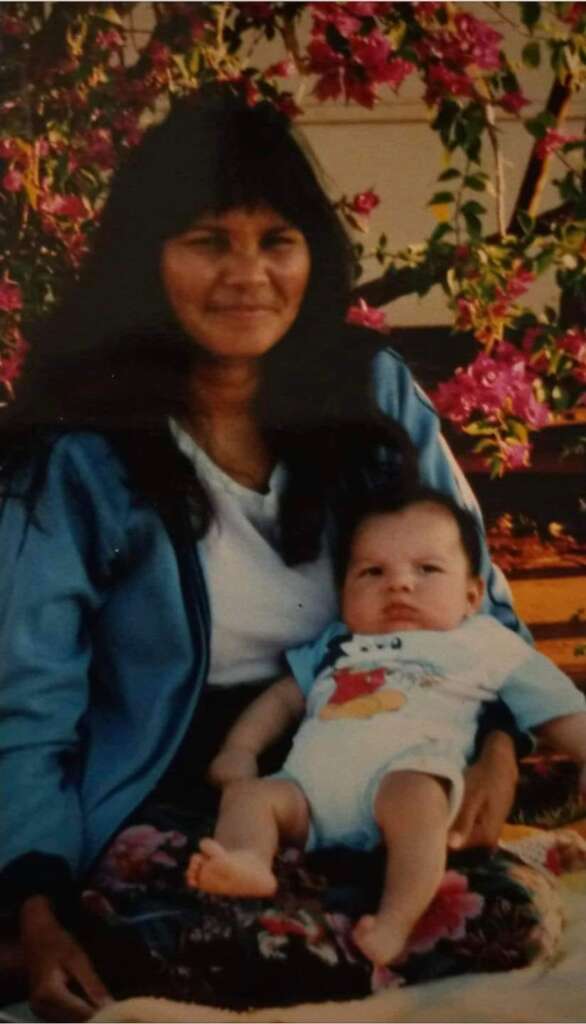
Francine with her son Billy
On Year 12 completion, Ngardarb closed the gap. For high school, she left her family on the Dampier Peninsula for Tuart Hill High School in the northern suburbs of Perth, boarding nearby. After gaining secretarial skills, she turned the tables. Soon, it would be the Indigenous girl who was the missionary.
On literacy, Ngardarb closed the gap and then some. She not only earned a Master’s and a PhD, but she also went on to teach art therapy at university. Though she grew up when governments were actively shutting down Christian missions, Aunty Francine became a passionate Bible Teacher. Though her strength was sapped by cancer last year, she still rose to teach Paul’s letters to blackfellas and whitefellas alike at the 2023 Kimberly Convention ladies’ meeting.
Though she grew up when governments were actively shutting down Christian missions, Aunty Francine became a passionate Bible Teacher.
On employment, Ngardarb closed the gap. At age 17, she took a role at the Carnarvon Mission of the Churches of Christ Federal Aborigines Mission Board. At 18, she became the house mother to four children, who soon became eight, on top of secretarial duties at the office.
Of course, these are the gaps that secular statisticians focus on. In her life and ministry, Aunty Francine was interested in much bigger gaps – beginning with the spiritual chasms caused by skin colour in our country, even in the church.
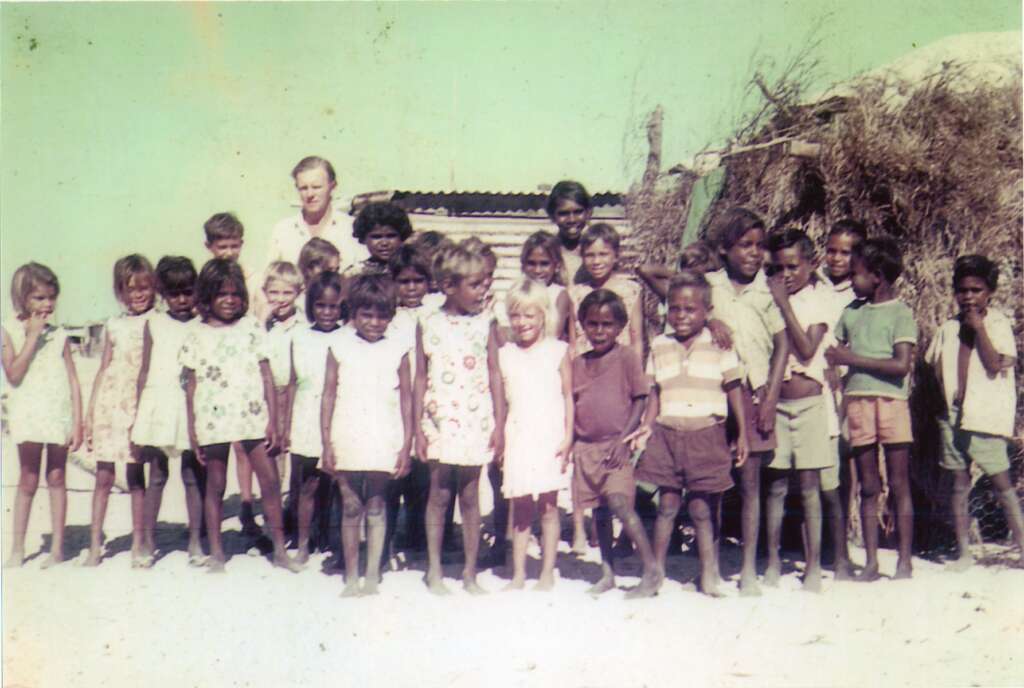
Francine in the second row, behind the boy in a purple T-shirt, at the beach school at One Arm Point, circa 1973
Francine’s birth certificate records her being born on 7 July 1964, at the Native Hospital in Derby. Her mother was too dark to be admitted to the newly built town hospital. Ironically, she was also seen not as too black but too white. Her mother’s mother would rub her daughter’s body with fat and charcoal – anything to stop the dreaded ‘welfare’, who would take the child into government care, if sufficiently white.
For her father’s adoptive mother, Ngardarb was also too white. She claimed, “It’s a white man’s child,” so her birth certificate doesn’t record the father’s name. His family disowned little Ngardarb. The baby couldn’t possibly be his; she was too fair. (Her maternal grandmother was French-Mauritian). The young man’s mother was from the desert, but his father was a Scottish Station owner.
Hard history had carved out these gaps. Ngardarb’s mother’s people on the Dampier Peninsula had, somehow, survived the slaughters of nearby La Grange (her father’s people) and Roebuck Bay, the leprosy breakouts and more. The Bardi were not spared the brutality of the pearling industry – where the options were to dive and risk death by drowning or simply get shot.
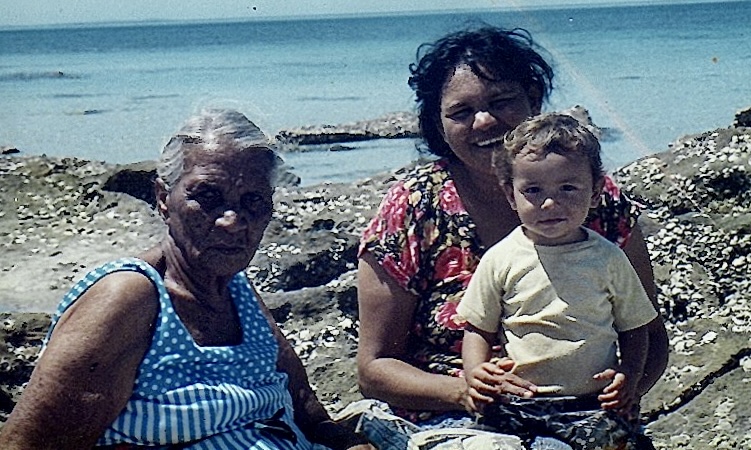
Francine with her grandmother Dolly and son Daniel.
But while some settlers brought atrocities to hew a gulf between us, others came with something like a bridge. I’ve heard some Aboriginal pastors call it “the one good thing.” Ngardarb’s grandfather would later say, “God, we already knew. But we didn’t know about Jesus.”
The Bardi prized the book Jesus came in, too. They were lifted by its stories. The Bardi people especially related to Exodus because they knew all too much about slavery and exile. Over time, they came to believe that they were like the children of Israel. And that the great island at the end of the Dampier Peninsula was their promised land. A land not so much of milk and honey as dugong and turtle. They returned there, but by the late 1960s, they left Sunday Island for nearby One Arm Point on the mainland, now known by its original name, Ardyaloon.
Closing gaps and crossing nations takes all kinds of bravery.
Ardyaloon is about as far as you can get from the small town of Camperdown in the Western Districts of Victoria. And the chance of a saltwater girl from the extreme North West ever meeting a young country boy from the deep Southeast could best be described as remote. “But,” says Pastor Tony today, “the Lord had a plan.”
Before he met Francine, Tony Riches had led an isolated life in country Victoria, knowing little about Indigenous people. He remembers as a boy staring at the picture of an Aboriginal hunter and a crocodile on a teatowel from Fitzroy Crossing, which had always left him with the thought, “Gee, he’s brave.”
Closing gaps and crossing nations takes all kinds of bravery. At age 19, Tony was brimming with courage when he heard of a need one Sunday. The call was for helpers at an Indigenous Mission near Carnarvon. The pay was $42 a week. Tony was there by Wednesday. His job was as a maintenance man, but he went on to take care of 16 old folks. To look after the young kids, they’d hired a school leaver, who would be coming down from One Arm Point, called Francine. Their love of Christ, in whom there is no Barbarian, Scythian, slave or free, was bringing them, inexorably, together.
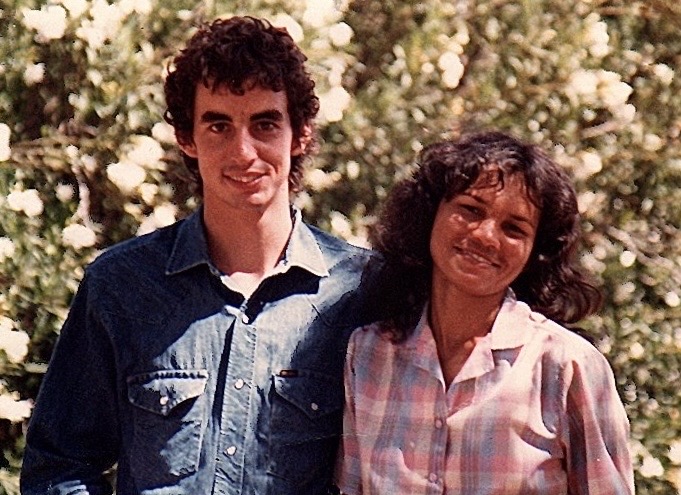
Tony and Francine Riches, newly married, January 1984
But while the Lord had a plan, it seemed to contradict the firm advice of a missionary with whom Tony and Francine were working. After the couple’s friendship blossomed, Tony told them he hoped to marry this beautiful young Christian woman. Some objected. Not because they were relatively young. No, it was the old chasm of race, “Your children will be different colours to each of you, which is unfair to them. There could be throwbacks.”
Francine, however, has always built bridges between the angry and the hurt, the learned and the ignorant, and black and white. Surrounded by family from both sides, the wedding day in Carnarvon went off without a hitch – except the January heat meant the top tier of the wedding cake sank like an anchor into the bottom tier.
This propensity to cross over, to walk towards difference, and to show grace means you can connect with almost anyone. And they did. With a Toyota Hiace, they began a ministry to all kinds of Aboriginal communities, from traditional people at One Arm Point to professional footballers in Footscray, Melbourne. Aunty Francine had such a deep faith in Christ and a clear sense of who she was that she could engage almost anyone, from academics in Melbourne to the royal family in Denmark. But her special gift was to notice and reach the unseen, the unheard, the left behind. This was recognised with the Citizen of the Year in 2014 and by being added to the Victorian women’s honour roll in 2015. She was, however, more excited to have her name recorded on the ‘roll up yonder’.
With a Toyota Hiace, they began a ministry to all kinds of Aboriginal communities.
Her sons’ education led her to travel to the US, her sculpture to Denmark, her passion for Bible translation to Fiji, and her faith to Israel, where she was baptised in the Jordan River.
Before they left their pastorate in Melbourne to return to WA and reconnect with their sons and wider family, Francine reached a soul who seemed to have nothing but gaps. Uncle Roy, a Yorta Yorta man who was taken from his family as a small boy, once said he couldn’t visit a church because “I’ve got too much hate, ripping apart my stomach, I’ve got a big hole in there.”
Aunty Francine was the only one who could bridge the gap between Roy and his heavenly father. At his baptism, he said, “this angel beside me, she showed the Lord loves me.” Roy also helped the homeless, disadvantaged and disabled in Maribyrnong, for which he was named Citizen of the Year in 2015. When asked who inspired him, he said it was Francine and Tony. He was a different man now. A gap had been filled. “I don’t have a hole in my stomach any more. All this hate. It’s just gone!”
Aunty Francine was the only one who could bridge the gap between Roy and his heavenly father.
There was one gap that – painfully – Francine didn’t fill. That she hadn’t reached her 60th year means she, like so many of our Indigenous brothers and sisters, died well before her time. However, that’s not the way Pastor Tony sees it. Surrounded by grandchildren and a nation scattered with blackfellas and whitefellas who know Christ and his love because of her, everything was complete. He said,” She has finished her course, run her race well and is now with the one she loved the most”.
“While her influence lives on, she will be deeply missed”.
Email This Story
Why not send this to a friend?


